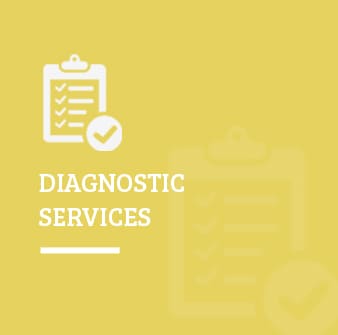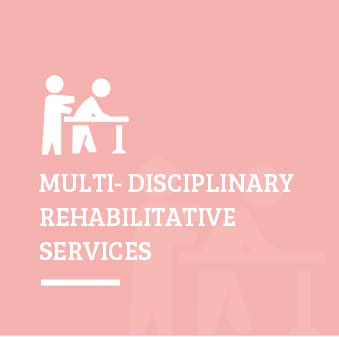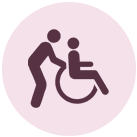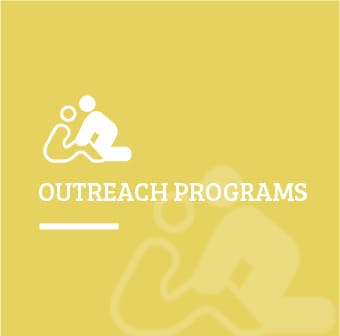-

Call for appointment
022-45160265
+91 9619421067 -

Email here
anjana@niramayahospitals.in


It is well documented that nearly 10% of children suffer from one or more problems related to Development, Behavior and Learning. A Child’s development needs to be monitored carefully in order to identify early signs of any delay or faltering. If intervened early, these problems can be resolved to a large extent and prevent any major concern in later life.
Niramay Guidance Clinic was started by Dr. Anjana A Thadhani along with a multidisciplinary team with the aim of providing holistic care of these children. At Niramay Guidance Clinic, we assess each child based on his or her potential and specific problem areas which are carefully delineated using various standardized diagnostic tests. This is followed up with counseling of the caregivers and child regarding the identified problems, and appropriate remedial measures are then recommended and implemented.
Niramay Guidance Clinic is a multidisciplinary centre for diagnosis, intervention and rehabilitation of children with special needs. Niramay guidance clinic has centers at Mumbai and Lucknow. Each centre is well – equipped with a team of consultants, counselors and therapists to effectively manage children with academic, behavioural and other developmental issues.
Our clinics are based on Teamwork with reliability of assessment and diagnosis, affordability, effective coordination & communication, credibility and continued care and rehabilitative services.The goal is to increase awareness and knowledge of children's physical, mental, social and emotional development. These services aim to empower the parents to understand the needs of the child and be a part of a home based intervention program along with therapist.


Aakash was enrolled for speech therapy at 3 years of age, on detailed evaluation he was found to have fine motor and sensory perceptual deficits and was started with OT sessions. Medical evaluation showed subtle dysmorphism with mild frontal bossing, high arched palate, mild pectus excavatum, long and slender fingers, joint hypermobility and flat feet. He had a high myopic refractive error and bilateral lens subluxation.
Rekha was a preterm child and was admitted in the Neonatal Intensive care for 2 months. Her growth was slow and was not even sitting at 1 year of age. She had difficulty in playing with the toys and had an squint. Her mother felt that she felt tight as compared to other children of her age.
Children with difficulties during pregnancy and birth generally termed as High Risk pregnancy or Intensive care immediately after birth have a high chance of developing Delayed Development. Regular measurement of weight & height of the child helps to monitor growth during early years. It helps in early identification & treatment of short stature and poor growth. However the Development of the child usually gets missed unless there are major concerns. It is known that the minor & subtle developmental concerns have the potential to cause major problems later but they also respond very well to treatment.

Aman, a 4 yr old male child usually spins around the furniture and difficult to control. When on bed he rocks himself to sleep. His interaction with his parents is less for his age. He is unable to follow simple commands at home and at play school. He just repeats words and uses jargon which his mother cannot understand. He occasionally gets aggressive with peers and screams without any clear reason. To an outsider, Aman looks like a typical overactive child full of energy.
Simran is 6 years old and is a very quiet child. Her mother says that she is a very shy child and still hides behind her mother if an outsider comes to her house. At school she follows instructions and is doing well. She does not participate in group activity at school and has no friends. During her visit to the doctor she had poor eye contact and demonstrated minimal interaction.
These children belong to the Autism Spectrum Disorder which is not so uncommon anymore. Most of these children have behaviour which is extreme and affects their learning and play. Though children with Autism Spectrum Disorder show mild to serious disability, many autistic kids display exceptional abilities in visual skills, music and academic skills.
The symptoms vary greatly from child to child depending on the severity and age. Smaller children present with speech delay, hyperactivity and difficulty in following instructions or learning. The children usually have poor eye contact, excessive shyness, poor speech, repeating the same words, excessive clinginess to toys, spinning, rocking etc. Some patients may show aggression and biting behavior.

Raghu is always on the move, much as his mother would want him to settle down. His teachers always complain and find it difficult to manage him in class. He is always out of place and misses out the instructions. Over a period of time, his grades have also started falling. His mother has started wondering if her child is hyperactive or just too active...
Hetal, a ten-year old child, is showing problems in studies. She can say the spelling correctly, but writes it wrong. Her written work is often incomplete and she is starting to show failures in class tests. Her father feels he too was same in his childhood and could she be having Dyslexia…
Sonu stays aloof in his class and does not participate in group activities. He appears a bright child but does not answer in class. His teachers wonder if he is ready for schooling.
It is not unusual to find such children around us. As Clinicians, while working with children we often wonder, about missing something or the dilemma of not picking up these subtle yet significant difficulties at the right time and giving them the correct prescription and advice.
Learning is the process of acquiring and retaining knowledge. It is generally noticed that 10- 15% of children in a classroom get poor marks, they are ‘scholastically backward’. There are many reasons for children to perform poorly at school. These include medical problems including neurological or other chronic diseases related to frequent school absenteeism, below average intelligence, specific learning disability, attention deficit hyperactivity disorder, emotional problems, poor socio-cultural home environment, psychiatric disorders and even environmental causes.
In most of the cases children with academic problems also lack self confidence and display behaviours like aggression, anxiety, school phobia, addictions and depression.

We recognize the need for services and support required during the transition period of adolescence as it could be challenging time to them.
Nilesh was referred to our clinic through a psychiatrist as he presented with severe depression with a recent suicidal attempt. During interview it was found that he was facing academic difficulties and had failed in all subjects in his degree course. He underwent detailed evaluation, aptitude testing and guidance sessions at our clinic. He was found to be low in mechanical and numerical ability and was advised a alternative career option. This helped him immensely and he is doing well now.
It is commonly observed that children seek admission in higher courses based on peer pressure, parental expectations with no class of their own aptitude, interests or capabilities.


Neurodevelopmental therapy aims to promote development of the nervous system and the inhibition of primitive reflexes. By incorporating movements which are used naturally by a baby and a young child, the nervous system is gently encouraged to mature and become more open to learning. It is used for children with developmental delays & spasticity.
Physical therapy attempts to address the illnesses, or injuries that limit a person's abilities to move and perform functional activities in their daily lives. Most effective in early years and helps to achieve motor milestones in the child.
We have a team of Physical Therapists to help children with motor delays and provide the initial support needed in the process of rehabilitation. Most children may need other therapies during the course of time and a comprehensive centre with many therapist working together introduces the parents to the possibilities of overcoming many difficulties later on.

Giving children the ability to communicate effectively & clearly is essential. How we speak is fundamental to success in our relationships with peers, family, and co-workers. Speech is also very important in the process of Learning. Delayed speech, poor articulation, stuttering etc are the commonly seen in children and adults.
Delayed speech could be a presenting symptoms of a number of conditions. Hearing loss could be a common cause for delay and a hearing evaluation is a must in all the cases of speech delay. Speech delay could accompany motor delay as in cases of High risk babies or could be the presenting complaint in a case of Autism. Poor articulation would lead to difficulties in learning alphabets and defective letter - word association in early years, an almost vital component of formal learning.
Our speech-language therapists provide treatment to children with speech and language delays with individual sessions to help them reach their milestones as soon as possible. Also children with fluency disorders or articulation problems can benefit from the same.

Occupational therapy focuses on helping children with Motor delays, Behavioural problems, Hyperactivity and Academic concerns like Poor Handwriting to achieve the appropriate level of functioning in their daily lives.
In other words occupational therapy is skilled treatment that helps individuals with disabilities, achieve independence in all facets of their lives. This includes performance of all daily normal activities in work, play, leisure etc. In children it involves handling difficulties in motor, sensory and perceptual areas which hamper their performance.
The therapists at our clinic uses various techniques like Sensory Integration Therapy, Perceptual – Motor Therapy etc as per their areas of concern.

Children with academic problems like Dyslexia, Slow Learner would have many difficulties in learning. A detailed assessment helps to understand the extent of the problem & his capabilities to cope with academics. It is important to explain the parents the need for the long term intervention.
As needs of each special child are different, we firmly believe that special education should be done only on one-on-one basis with specific Individualized Education Programs for each child. This education plan is created based on a detailed Psycho-Educational assessment which clearly states the areas of strength & weaknesses in academics. The Educator then starts bridging the gaps in learning in different areas and sets short term & long term goals.
All children who are undergoing special education at our Clinic are given individual attention and hence improvement in their performance is much faster. Other therapies like counselling, occupational therapy may also be needed simultaneously and role of each professionals need to be understood by parents. A coordination among the team with periodic meetings with parents and therapist increases communication and resetting of the goals. These meetings are facilitated at the clinic regularly.

Shree was diagnosed as West syndrome at 2 yrs 9 mths, his milestones were delayed with independent walking at 26 months and few monosyllables with meaning by 24 months. His convulsions decreased in frequency by 5 yrs, subsequent follow up showed emergence of motor stereotypies, echolalia, aggression, hyperactivity, inability to follow instructions. Now he is 9 yrs old with severe behavioural problems. He was diagnosed as a case of West syndrome with Delayed Development & Autism
Behavioural problems could be primary related to their medical conditions, other developmental disabilities, personality, environment and parenting. Children & teens show behavioral concerns, when not able to cope with academic pressure, parental anxiety or social demands. In quite a few cases, Behavior is a symptom of the underlying problem and if not handled could lead to psychological problems later in life. Early intervention is the best way to prevent the future occurrence of severe behavioral issues or mental illness in extreme cases.
Counseling is directed mainly at parents along with communication with teachers to follow classroom modifications in younger children. This helps to shape up the child’s behavior. For older children, both children and parents are counselled to bring in effective changes. Various techniques such as CBT, REBT etc is used for counselling by our counsellors.

Dr. Thadhani believes in empowering the parents & community to identify the concerns early and has been reaching out to the masses by interacting with children and parents at different platforms such as schools, pre-schools, Rotary Clubs and other social & medical organizations.
As child spends a large amount of his time in schools, we collaborate and sensitize teachers through workshops at school. We also communicate with schools regarding each child and work together with school to provide long term support. This essentially enables the child to achieve his true potential.